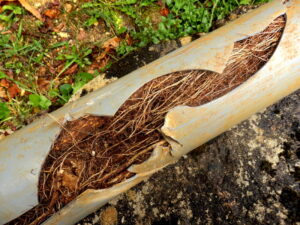Clogged drains and sewer lines are among the most common—and frustrating—plumbing issues homeowners face. From slow-draining sinks to full-blown sewage backups, these problems can quickly escalate if left untreated. Knowing what causes these clogs is the first step toward prevention. Here are the most common culprits behind drain and sewer clogs and how to avoid them.
1. Grease, Fat, and Oil Buildup
Pouring cooking grease or oil down the kitchen sink may seem harmless, but once it cools, it hardens and clings to the inside of your pipes. Over time, this buildup narrows the pipe and traps other debris, eventually causing a complete blockage. Instead, collect grease in a container and dispose of it in the trash. If you’re already noticing slow drains, it’s a good time to call in a professional for a safe and thorough cleaning.
2. Hair and Soap Scum
Hair is a notorious drain blocker, especially in bathroom sinks and showers. Combined with soap residue, it forms sticky clumps that snag on pipe joints and rough surfaces. Using a drain guard can significantly reduce the amount of hair entering your plumbing.
3. Foreign Objects
From flushed wipes and cotton swabs to children’s toys, non-flushable items can create major blockages. Even products labeled as “flushable” often don’t break down properly, leading to obstructions in the sewer line. Only toilet paper should be flushed—everything else belongs in the trash.
4. Tree Root Intrusion
Tree roots are naturally drawn to moisture and can invade even the smallest cracks in your sewer lines. As they grow, they create a web inside the pipe that traps solids and leads to major blockages or even collapsed pipes. If you have older pipes and large trees nearby, regular inspections can help catch this early. Root removal and pipe repair are complex jobs that should always be left to professionals.
5. Mineral and Scale Buildup
In areas with hard water, minerals like calcium and magnesium accumulate inside pipes over time. This narrows the pipe diameter and can slow drainage or lead to complete clogs. Water softeners and routine drain maintenance can help prevent this.
6. Food Waste
Please don’t throw certain food scraps—like coffee grounds, eggshells, and fibrous vegetables down the drain or garbage disposal; this can damage your system or cause clogs. Scraping plates into the trash before rinsing them can reduce the strain on your drains.
7. Collapsed or Damaged Pipes
Over time, sewer lines can crack, collapse, or sag (a condition known as “pipe belly”). These structural issues disrupt the natural flow of wastewater and can cause persistent clogs. Professional video inspections can identify these problems before they cause extensive damage.
Prevention and Maintenance
The best way to avoid clogs is through regular maintenance and mindful usage. Be cautious about what you allow down your drains and schedule periodic professional cleanings. For residents experiencing frequent blockages, professional drain and sewer cleaning in Springfield Township is essential to keep your plumbing system running smoothly.
Established in 1912, Max Sr & Paul Schoenwalder Plumbing, Heating, and Air Conditioning is your trusted resource for reliable plumbing services in Springfield Township. Call us today!

